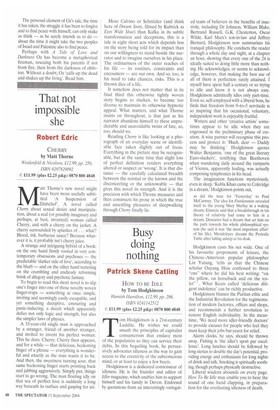That not impossible she
Robert Edric
CHERRY by Matt Thorne Weidenfeld & Nicolson, f12.99, pp. 256, ISBN 0297829092 111.99 (plus £2.25 p&p) 0870 800 4848 matt Thorne's new novel might have been more usefully subtitled 'A Suspension of Disbelief'. A novel called Cheny about sexual desire and manipulation, about a real (or possibly imaginary and perhaps, at best, invented) woman called Cherry, and with a cherry on the jacket. A cherry surrounded by splashes of. . . what? Blood, ink, barbecue sauce? Because whatever it is, it probably isn't cherry juice.
A strange and intriguing hybrid of a book: on the one hand firmly rooted in very contemporary obsessions and psychoses — the predictable 'darker side of love', according to the blurb — and on the other hand teetering on the crumbling and endlessly reforming brink of allegory and psychotic fantasy.
To begin to read this short novel is to slip one's finger into one of those novelty woven finger-traps — something at once simple, inviting and seemingly easily escapable, and yet something deceptive, ensnaring and panic-inducing; a deceit which apparently defies not only logic and strength, but also the simpler laws of physics.
A 33-year-old single man is approached by a stranger, friend of another stranger, and invited to invent his perfect woman. This he does: Cherry. Cherry then appears, and for a while — that delicious, beckoning finger of a phrase — everything is wonderful and exactly as the man wants it to be. And then, the sweetness turning sour, that same beckoning finger starts pointing back and jabbing aggressively. Simply put, things start to go wrong. The man floating idly on that sea of perfect love is suddenly a long way beneath its surface and gasping for air. More Calvin° or Schnitzler (and think here of Dream Story, filmed by Kubrick as Eyes Wide Shut) than Kafka in its subtle transformation and deceptions, this is a tale in eight short acts which depends less on the story being told for its impact than on our willingness to stand beside the narrator and to imagine ourselves in his place. The ordinariness of the outer reaches of his life — its routines, constraints and encounters — are our own. And so, too, is his need to take chances, risks. This is a thrown dice of a life.
It somehow does not matter that in its final third this otherwise tightly woven story begins to slacken, to become too diverse to maintain its otherwise hypnotic appeal. What matters, and what Thorne insists on throughout, is that just as his narrator abandons himself to these unpredictable and unavoidable twists of fate, so, too, should we.
Reading Cherry is like looking at a photograph of an everyday scene or identifiable face taken slightly out of focus. Everything in the picture may be recognisable, but at the same time that slight loss of perfect definition renders everything altered or suspect or 'wrong'. It is that distance — the carefully calculated breadth between the normal or the known and the disconcerting or the unknowable — that gives this novel its strength. And it is the precision with which Thorne measures and then constructs his prose in which the true and unsettling pleasures of sleepwalking through Cheny finally lie.










































































 Previous page
Previous page